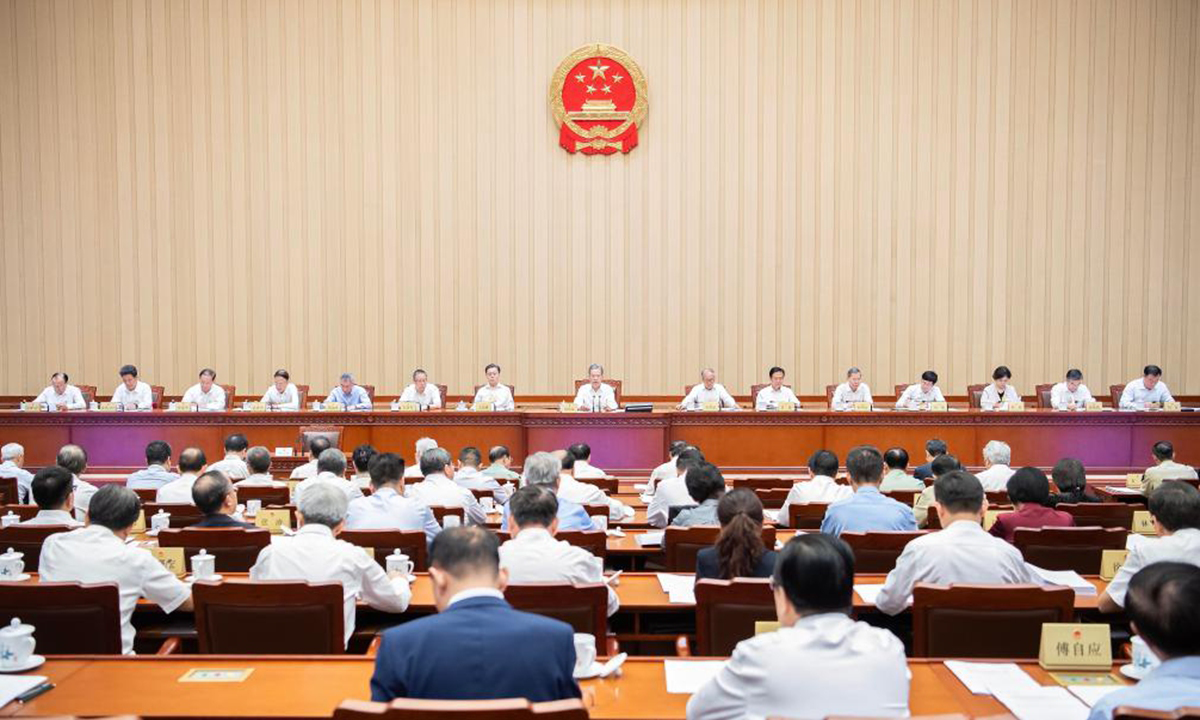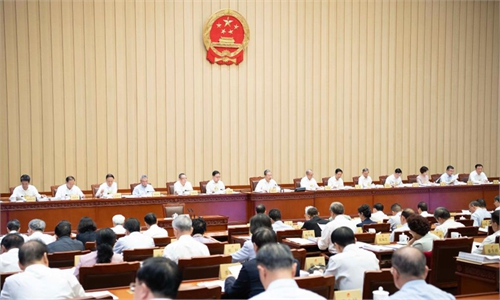China to raise statutory retirement age in next 15 years
New plan aligns with national conditions, intl practices: experts

Zhao Leji, chairman of the National People's Congress (NPC) Standing Committee, presides over the closing meeting of the 11th session of the 14th NPC Standing Committee at the Great Hall of the People in Beijing, capital of China, Sept. 13, 2024. Photo:Xinhua
China's top legislature on Friday adopted a decision on gradually raising the statutory retirement age in the country. The retirement age for men will be raised from 60 to 63 in the course of 15 years starting 2025, while for women cadres it will be raised from 55 to 58 and from 50 to 55 for women blue-collar workers, the Xinhua News Agency reported.
The decision adopted at the 11th session of the Standing Committee of the 14th National People's Congress marks the first adjustment in the arrangement since 1950s. The plan was formulated on the basis of a comprehensive assessment of the average life expectancy, health conditions, the population structure, the level of education and workforce supply in China, according to Xinhua.
Experts noted that the adjustment aligns with domestic changes in demography and the country's overall development as well as international practices, which will also actively help tackle the demographic change in an aging population.
Starting 2030, the minimum year of basic pension contributions required to receive monthly benefits will be gradually raised from 15 years to 20 years at the pace of an increase of six months annually.
People will be allowed to voluntarily retire by no more than three years in advance after reaching the minimum year of pension contributions. But it is not allowed to retire earlier than the previous statutory age.
The new plan will also allow individuals to postpone retirement to an even later date if they reach an agreement with employers, but such a delay should be no more than three years.
The move will help enhance the efficiency of labor supply amid the population aging and a continuous decrease proportion of the working-age population, Minister of Human Resources and Social Security Wang Xiaoping said at a press conference on Friday. Wang noted that the reform will also be conducive to promoting the development and utilization of human resources.
This approach is necessary for coping with China's current national conditions and future economic and social development, and will help actively address population aging, Yuan Xin, vice president of the China Population Association and a professor at Nankai University, told the Global Times.
The reform is of profound significance in improving the country's labor force structure and extending the demographic dividend, according to Li Chang'an, a professor at the Academy of China Open Economy Studies of the University of International Business and Economics.
Li Chang'an noted that gradually raising the statutory retirement age will help achieve a solid foundation and sustainable development for the country's pension system.
Supporting policies
The decision adopted on Friday specifies measures to refine the old-age insurance incentive mechanism, implement the employment-first strategy, ensure the basic rights and interests of workers who have passed their statutory retirement age, and improve elderly care and childcare services, according to Xinhua.
The document includes specific provisions on welfare for unemployed old-age workers and on earlier retirement for those in special professions.
Addressing the concerns regarding the reform's impact on youth employment, Li Zhong, vice minister of Human Resources and Social Security said on Friday that the overall impact remains flat, as the implementation of the measures will be a gradual process carried out on a small scale, while there are structural differences between the jobs vacated by retirees and those needed for the young population.
Li Zhong noted that the ministry will further strengthen the employment-first strategy, continuously expanding the channels for youth employment and advancing employment in both qualitative and quantitative development.
When it comes to stabilizing and safeguarding the job market, the new document sets out more diversified and personalized ways of continuing employment for gradually raising the statutory retirement age, Yuan said.


